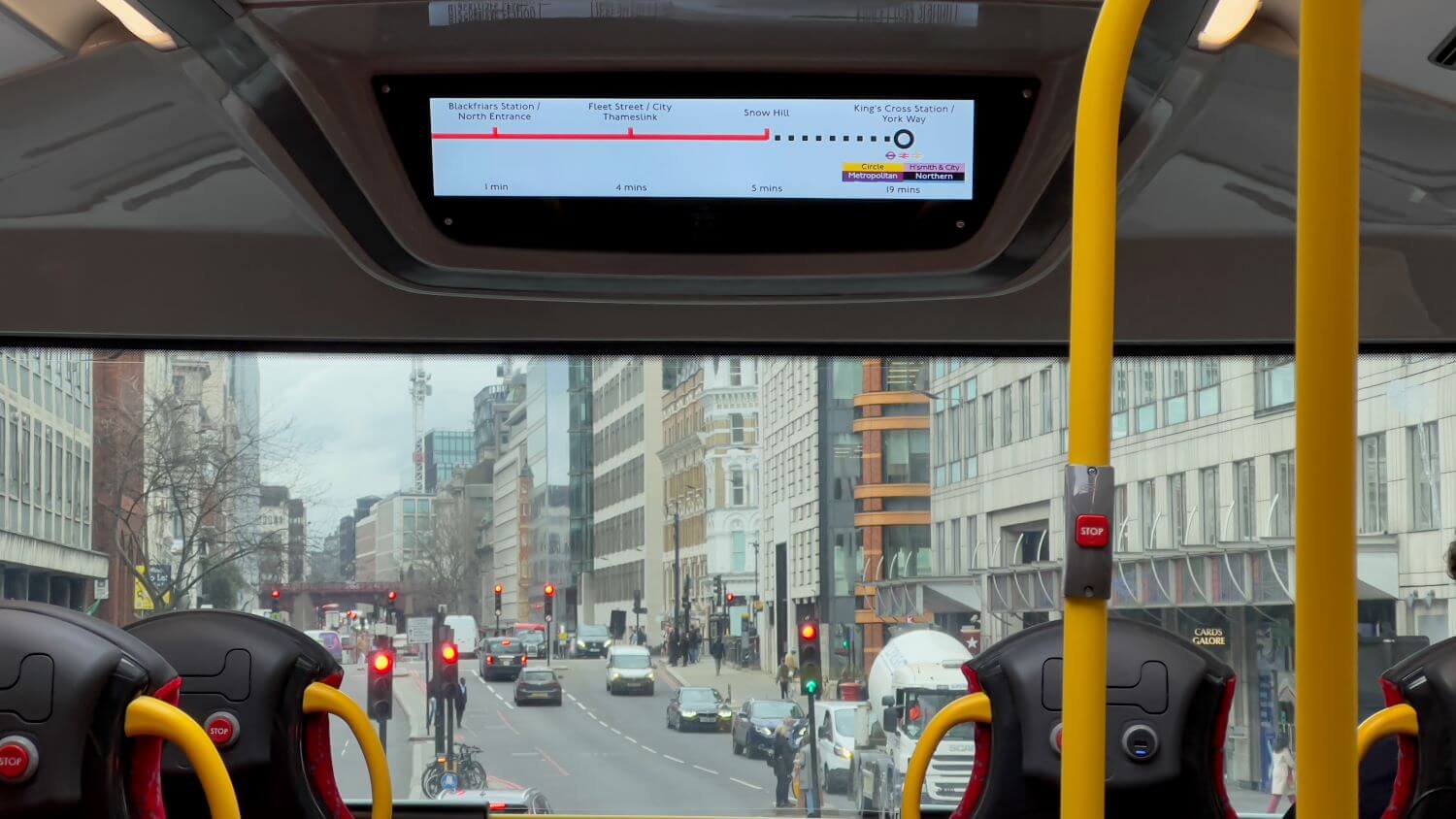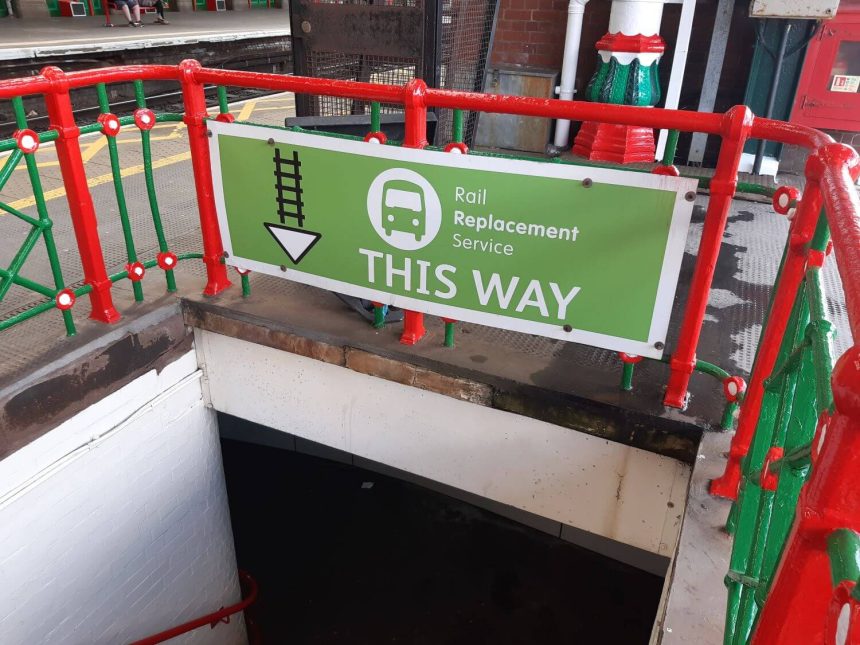Operators that are engaged on in-scope rail replacement work are being encouraged to act urgently to ensure the vehicles they use for it meet new Public Service Vehicles (Accessible Information) Regulations (AIR), which are set to be phased in from 1 October.
Concern is being expressed over the readiness of the industry to comply with the forthcoming legislation.
The regulations concerning audio and visual passenger information on local services have been reasonably well understood by bus operators since they were announced by the Department for Transport (DfT) in March 2023.
However, it has been less clear until recently that rail replacement services — including those operated by coaches — will also fall within scope.
One major rail replacement company told routeone that the requirement will make it impossible for train operators to find enough cover and called for an amendment in the legislation.
Further, although £4.65 million in government funding for retrofitting is available to operators with 20 or fewer vehicles, the fact that applications opened as late as 8 April and the slow response to that since have caused further worry.
Confederation of Passenger Transport (CPT) Operations Director Keith McNally says: “We’ve been trying to flag to members that they need to get ready for October and we’ve also been highlighting the rail replacement aspect.
“There’s a level of awareness out there, but we’ll continue to try and make sure all our members know. It’s dawning on a lot of people that this is a potential problem.”
Andy Warrender, RHA Operations Manager for Coaches, admits the issue has “taken the industry by surprise”.
The regulations require the provision of audible and visual route and upcoming stop information, meaning retrofits costing several thousands of pounds per vehicle will be needed by many operators.
Clarification in April by legal experts Backhouse Jones and JMW Solicitors that they will apply equally to rail replacement services has led to concern for smaller coach operators that do not carry out any other in-scope work.

Local services are defined as those where more than half the route comprises distances between stops of less than 15 miles measured in a straight line.
Rail replacement operators may be able to take advantage of the long-distance exemption by arranging for different vehicles to go to different stations.
Dire situation forecast
The loudest alarm bell has come from a major rail replacement company which wanted to remain anonymous.
Its statement read: “The proposal to require all coach and bus operators with stops less than 15 miles apart to have audiovisual (AV) announcements from October will result in little to no rail replacement services being available to train operators.
“We estimate around 86% of the vehicles that currently provide rail replacement services do not comply with this requirement.
“The cost to retrofit the kit to enable AV announcements is over £120 million and we don’t consider that it’s even feasible given the very high number of alternative routes that these coaches and buses can cover.
“DfT has failed to consult with the industry on this amendment and needs to agree an amendment or exemption for rail replacement coaches and buses.”

DfT declined to comment in response, citing the pre-election period, but instead referred to the graduated implementation timeline, which means it will not apply to some vehicles until 1 October 2026.
Vehicles first used on local services on or after 1 October 2019 must comply from this autumn. However, vehicles first used between 1 October 2014 and 30 September 2019 will have until 1 October 2025.
Vehicles first used between 1 January 1973 and 30 September 2014 will have that 2026 deadline.
Those which were “partially compliant” immediately before 1 October 2023 according to DfT’s definition will have until 2031 to comply fully.
JMW Solicitors Partner – Co-Head of Commercial Road Transport Laura Hadzik confirms that the legal responsibility for services to comply remains with the operators rather than train operating companies but adds: “If train operating companies do not work with coach and bus operators to address this issue, there appears to be a very real risk that the industry will face a shortage of rail replacement operators post-1 October.”
The scale of the issue
A survey with 30 respondents recently undertaken by the CPT, found that 7% of those operators’ total revenue comes from rail replacement work — although that includes routes which would not be considered “local”.
This is “not an insignificant amount”, says Keith, although he admits the percentage is likely to be lower in reality due to sampling bias.
Either way, while rail replacement may not be considered essential to a lot of operators, some smaller businesses may suffer if this type of operation was not an option, with the survey also finding it represented 40% of the overall work for one operator.
Another finding was that, of those operators which do rail replacement that is classified as local, the maximum number of vehicles they would have on such work at any one time was 8% of the overall fleet.

Keith says: “The vast majority of the time they’re not using them on rail replacement, which means there is a much weaker case for spending money to get them up to the standard — albeit that there is a good chunk of that remaining time that they use them for other things in scope, such as local bus services.”
Keith adds: “A lot of those who responded said they simply wouldn’t do it any more. But, maybe if the rail replacement operators say they would pay £1,500 a day, then they’d probably say ‘yes, it’s worthwhile spending a few thousand pounds on some of my vehicles’.”
On that note, Andy adds: “Operators will inevitably be questioning whether they should be investing even more for what we’re hearing is a reducing return.”
He adds that he has heard that at least some of the rail operating agencies are insisting all vehicles employed for rail replacement will have to be compliant, perhaps to make allocation easier, ruling out the possibility of operators taking on only long-distance work.
Andy raises the idea of portable equipment which makes use of existing video monitors and public address systems and which could be moved between vehicles.
“We’ve yet to see a system like this so it seems that it’s little more than hypothetical at this stage, but it could be a popular route for coaches if it did become available,” he says.
When it comes to permanent kit, Andy says he has heard talk of lead times of between 8 and 20 weeks for the supply of the equipment, with some suppliers citing 2025 as the earliest opportunity for installation, adding that this situation could worsen as the deadline approaches.
Operators respond
Kevin Hailey, Director of Wishaw-based Kevin’s Coaches, complains he has bought three new PSVAR-compliant coaches in the past 14 months but was not offered an upgrade to include compliant AV installations.
Kevin, who is currently applying for the grant for small operators, adds: “I’m genuinely thinking that rail replacement companies are just waiting on the exemption certificate coming through. There’s not been a great deal of communication from them.”
Carl Stott, Director of E Stott and Sons, says: “We don’t operate a lot of rail replacement, but we have done recently due to major works on the Transpennine route and, if AIR applies to in-scope rail replacement as expected, multiple problems will arise…
“One issue could be that, if some coach operators decide they don’t want to fit this equipment and choose not to do rail replacement, especially with the coaching market being so buoyant, this could result in a shortage of vehicles. Another issue will be programming the equipment for ad-hoc jobs.”
There is a looming uncertainty of what costs are going to be involved with it and whether it is even worth us carrying on. A lot of us have built businesses around this work – Jamie Burrows, Burrows Coaches
Jamie Burrows, Director of Blandford Forum-based Burrows Coaches, who says around half of his business’s revenue comes from rail replacement contracts, adds: “There are a lot of unknowns because we haven’t heard anything from the rail replacement companies at all.
“There is a looming uncertainty of what costs are going to be involved with it and whether it is even worth us carrying on. A lot of us have built businesses around this work.”
The owner of another coach operator, who wished to remain anonymous, adds: “Rail replacement work plays a big part of our business and we have invested heavily into PSVAR vehicles.
“While we are continually looking at keeping the fleet up to date, one has to question where the money is coming from to keep up with the legislation.
“Sadly, I feel, like many small operators, we are being forced out as we do not have the financial resources like bigger companies.”
The grant process
Keith says the fact that DfT started the grant application process so late was disappointing in that some operators may have held back making an order due to this and that the opportunity for purchase and installation will be severely reduced by the time they hear if they are successful.
The Real-Time Information Group (RTIG), which is handling the application process on behalf of DfT, says the deadline, which was 3 June, has now been made open-ended until the pot dries up.
Due to a low number of applications received so far, the handing out of grants is now being dealt with on a first-come, first-served basis — rather than the original plan of the very smallest operators being allocated funding first.
RTIG General Manager Tim Rivett, who highlights that the application process is simple, adds: “We have been trying to bang the drum about the regulations and the grant for a good while now. It’s really difficult to get small operators to engage so we really would encourage the smallest operators to get a move on.”
That sense of urgency is also aired by Andy, who says: “Our general advice to members at this point is very clear: if they wish to continue to operate on rail replacement after October, they will have to comply with the new regulations or face potential enforcement action and ultimately, potential criminal charges for offences against the Equality Act.
“We remain in dialogue with DfT on the issue and have provided it with feedback which indicates that it’s likely there will be a reduced capacity for rail replacement after October.”



























